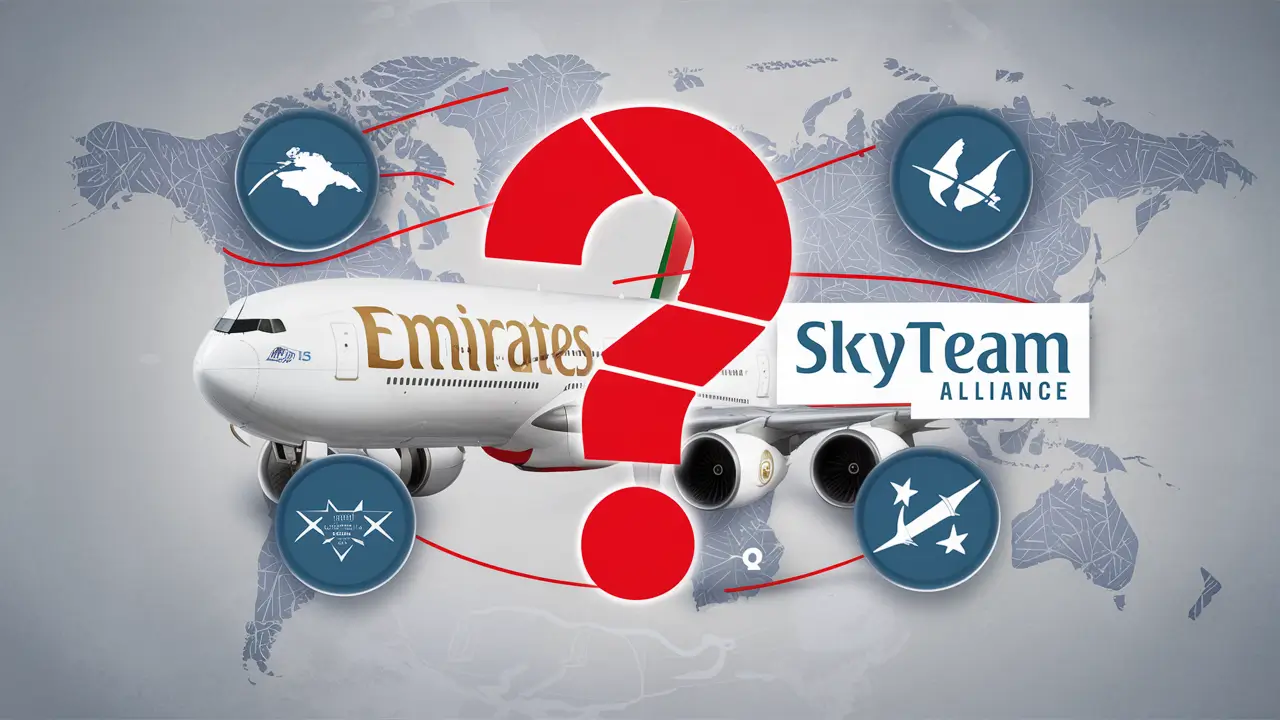Is Emirates part of SkyTeam?

It is also important to know if Emirates Airlines is a member of the SkyTeam alliance or not.
Nowadays, Emirates is considered one of the leading worldwide aircraft companies, with a thick interconversion organized interfacing six continents. In turn, not at all like numerous expansive around-the-world carriers, Emirates is not a member of one of the three large international alliances: the Star Alliance, SkyTeam, or the Oneworld Union. This article investigates Emirates' position on aircraft collusions and particularly addresses the address: The current Emirates Airlines are not members of the SkyTeam alliance, but the airline has signed a deal to join it.
What is SkyTeam?
SkyTeam is the youngest of the three major worldwide airline alliances, having started in 2000. The Sky Team consists of 19 members as of 2022: KLM, a Dutch airline; Air France; Delta Airlines; Korean Air; Aeromexico; among others. The SkyTeam members have been carrying 630 million passengers annually and operate in 170 countries overall.
Like other big airline alliances, SkyTeam was developed to enable member collaboration and codeshare to improve the links presented to its customers. Passengers are supposed to be able to book tickets on several SkyTeam airlines and accumulate points on every alliance member airline via the SkyTeam code-share agreement. Moreover, Sky Team Alliance members follow regulations as well as service delivery to provide consumers with consistent travel quality whenever they switch airlines.
What is the reason Emirates Airlines is not in any alliance?
Emirates, one of the top worldwide airlines with a fleet spanning 157 locations in 83 countries, is thus often questioned as to why it has not become an airline member. Emirates does so by forming code-share arrangements with other airlines even though it is not a member of any of the worldwide alliances; it does so autonomously without legally committing itself to any of the rigorous criteria.
There are several reasons why Emirates prefers to remain independent of the major airline alliances:
- Independence in the network and flight timetable: Emirates remains an independent, non-aligned airline that freely determines its route network, which constantly grows, rather than relying on cooperation with partners in terms of mutual routes and flight times. This also helps Emirates to develop its schedules based on its operations and any other strategic plans that it may have.
- It emphasizes its brands more than the deals; another strategic position of Emirates is the airline’s strive to become a leading premium airline brand around the world. Membership in such an alliance, for instance, may work in a way to compromises the goal of building a uniquely different brand that offers alliance deals.
- Self-imprisoning costs: a particular activity means sacrificing other activities, and the case of an airline alliance is not exceptional. Emirates has been operating as a very successful stand-alone carrier, and it does not see the value of joining an expensive alliance that is likely to impose more costs than benefits.
Does Emirates Airlines have codeshare flights with member airlines of SkyTeam?
Although Emirates remains loyal to the policy of non-membership in SkyTeam or one of the other large strategic partnerships, it collaborates with certain airlines outside the frameworks of cooperation within the mentioned alliances based on codeshare and frequent flyer programs.
For example, Emirates currently has codeshares in place with the following SkyTeam member airlines: For example, Emirates currently has codeshares in place with the following SkyTeam member airlines:
- KLM: This is a codeshare where the two airlines can share flight numbers and schedules, for example, Dubai to Amsterdam.
- Korean Air: Emirates has shared connectivity on some routes from Dubai to South Korea, allowing the airline to access more cities in South Korea.
- Aeromexico-Emirates: The two airlines have a codeshare agreement and operate flights between cities like Dubai and Mexico City and other routes, as well as between Mexico City and Barcelona.
The case of Emirates Airlines highlights the ‘Emirates Approach’ to airline partnerships.
Instead of being a member of a single global alliance, Emirates has decided to have individual membership in such alliances, thus being free to negotiate with any alliance for its benefit while at the same time ensuring that passengers are offered services that they would prefer. Apart from the SkyTeam codeshare partners listed above, Emirates also has extensive connectivity with Oneworld member Qantas Airways, as well as other well-ranked non-SkyTeam airlines like FlyDubai and Alaska Airlines.
The selected global alliance partnerships provide passengers with some benefits of travel on a global alliance while allowing Emirates’ selected partnerships to protect the award-winning Emirates brand, maintain control of its schedules, efficiently manage its complex route network that currently serves six continents, and remain aligned with its strategic long-term plan. Thus, although it may have some positive implications for being associated with SkyTeam, Emirates will not jeopardize its effective business strategy to join a worldwide airline alliance group shortly.
The Bottom Line
Therefore, in conclusion, Emirates, while having strategic partnerships with some of the member airlines of SkyTeam, like KLM or Aeromexico, has not joined the major airline alliances, including SkyTeam. This is because by continuing to not be a member of any alliance groups such as SkyTeam and Oneworld, Emirates has full control over specific business decisions relating to its strategic and competitive routes, its unique brand identity, and eventually the opportunity to continue to deliver to passengers its superior air travel experience.
Book your Delta Airlines ticket now! Call +1 833-902-2090
